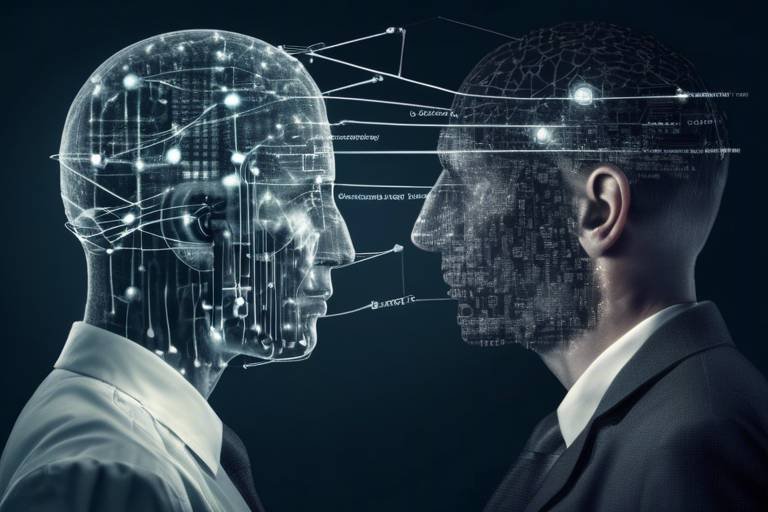Do Philosophy and Cybernetics Overlap in Cognitive Science?
The intersection of philosophy and cybernetics within the field of cognitive science is a fascinating area of exploration that unveils profound insights into how we understand cognition, intelligent systems, and the very nature of consciousness itself. At first glance, these domains may appear to be worlds apart—philosophy delves into the abstract and theoretical, while cybernetics is rooted in the practical study of systems and control. However, a closer examination reveals that they share a common goal: to decipher the complexities of thought and behavior, whether in humans or machines.
Consider this: philosophy poses the big questions—What is the mind? How do we know what we know? What constitutes consciousness? These inquiries lay the groundwork for cognitive science, providing a framework for understanding mental processes. Meanwhile, cybernetics introduces the concept of systems thinking, emphasizing the importance of feedback loops, adaptation, and control mechanisms. This blend of theoretical exploration and practical application creates a rich tapestry of knowledge that informs our understanding of cognition.
As we navigate this intricate landscape, we find that both philosophy and cybernetics contribute vital perspectives. For instance, the philosophical inquiry into the nature of knowledge and perception can enhance our understanding of how feedback mechanisms operate within cognitive systems. Conversely, the principles of cybernetics can challenge and refine philosophical theories by providing empirical evidence and models that illustrate cognitive processes in action.
This article aims to explore these overlaps in detail, examining how philosophical theories inform cybernetic principles and vice versa. We will delve into the philosophical foundations of cognitive science, the fundamental principles of cybernetics, and the implications of their intersection for artificial intelligence and the future of cognitive science. Join us as we embark on this intellectual journey, uncovering the surprising synergies between these two seemingly distinct fields.
Cognitive science is deeply rooted in philosophical inquiry, addressing questions about the nature of mind, knowledge, and consciousness. This section discusses key philosophical theories that have shaped cognitive science.
Cybernetics, the study of systems and control, plays a crucial role in understanding cognitive processes. This section outlines the fundamental principles of cybernetics and its relevance to cognitive science.
Feedback mechanisms are central to both cybernetics and cognitive processes. This subsection explores how feedback loops contribute to learning, adaptation, and decision-making in cognitive systems.
Adaptive systems illustrate the dynamic nature of cognition. This part delves into how cybernetic principles apply to adaptive processes in both artificial and biological systems.
Human cognition relies heavily on feedback from the environment. This section examines how feedback influences perception, action, and learning in cognitive psychology.
Philosophy and cybernetics converge in their exploration of systems and processes. This subsection highlights key philosophical questions raised by cybernetic theories and their implications for cognitive science.
The overlap of philosophy and cybernetics has significant implications for artificial intelligence. This section discusses how these fields inform the development of intelligent systems and ethical considerations.
As AI technology evolves, ethical questions arise regarding autonomy, consciousness, and responsibility. This subsection explores the philosophical debates surrounding the ethical implications of cybernetic advancements in AI.
Looking ahead, the integration of philosophy and cybernetics may shape the future of cognitive science. This section speculates on emerging trends and potential breakthroughs in understanding cognition and intelligent systems.
- What is the main focus of cognitive science? Cognitive science primarily explores the nature of the mind and how it processes information.
- How does cybernetics relate to cognitive science? Cybernetics provides a framework for understanding control and communication in complex systems, which is crucial for studying cognitive processes.
- Why are feedback mechanisms important in cognition? Feedback mechanisms enable learning and adaptation, allowing cognitive systems to refine their processes based on experiences.
- What are the ethical implications of AI development? Ethical considerations include issues of autonomy, consciousness, and the potential impact of AI on society.

The Philosophical Foundations of Cognitive Science
Cognitive science is not just a field of study; it’s a multidisciplinary adventure that dives deep into the mysteries of the mind. At its core, cognitive science grapples with fundamental questions about the nature of consciousness, perception, and knowledge. To truly appreciate how these elements interconnect, we must first explore the philosophical foundations that underpin this fascinating discipline.
One of the most influential philosophical theories in cognitive science is dualism, famously proposed by René Descartes. Dualism posits that the mind and body are separate entities. This idea raises intriguing questions: If the mind is distinct from the physical body, how does it interact with it? This philosophical quandary has significant implications for understanding cognitive processes, as it suggests that cognition may not be solely a product of biological functions.
In contrast, we have materialism, which argues that everything, including mental states, is fundamentally physical. This perspective leads us to consider how cognitive processes can be explained through brain activity and neural networks. What if our thoughts, emotions, and decisions are just complex biochemical reactions? This view encourages researchers to seek biological explanations for cognitive phenomena, pushing the boundaries of neuroscience and psychology.
Another critical philosophical perspective is functionalism, which suggests that mental states are defined by their functional roles rather than their physical makeup. This philosophy aligns closely with cybernetic principles, as it emphasizes the importance of systems and processes. For instance, functionalism allows us to consider cognitive systems—whether human or artificial—as entities that perform specific functions without necessarily being tied to a particular substance. This opens up exciting possibilities for artificial intelligence and machine learning, as we can focus on how these systems operate rather than what they are made of.
Moreover, the concept of embodiment has gained traction in cognitive science, suggesting that our cognitive processes are deeply influenced by our physical bodies and interactions with the environment. This perspective challenges traditional views that separate cognition from sensory experiences. It raises the question: How do our physical experiences shape our thoughts and understanding of the world? By examining the interplay between body and mind, researchers can gain deeper insights into how we learn, adapt, and interact with our surroundings.
As we navigate through these philosophical landscapes, it becomes clear that the intersection of philosophy and cognitive science is rich with potential. Each theory offers unique insights that can help us unravel the complexities of cognition. Understanding these foundations not only enhances our knowledge of the mind but also guides the development of intelligent systems that reflect human-like cognition.
In summary, the philosophical underpinnings of cognitive science are essential for exploring the intricate relationship between mind, knowledge, and consciousness. By examining dualism, materialism, functionalism, and embodiment, we can better appreciate the diverse perspectives that inform our understanding of cognitive processes. As we continue to investigate these philosophical questions, we pave the way for advancements in both cognitive science and artificial intelligence.
- What is cognitive science? Cognitive science is an interdisciplinary field that studies the mind and its processes, including how people think, learn, and remember.
- How do philosophy and cognitive science relate? Philosophy provides foundational theories that inform our understanding of cognition, consciousness, and the nature of the mind, influencing research in cognitive science.
- What role does cybernetics play in cognitive science? Cybernetics studies systems and control mechanisms, offering insights into how cognitive processes function and adapt, paralleling philosophical inquiries about the nature of intelligence.

Cybernetics: A Brief Overview
Cybernetics is a fascinating field that delves into the study of systems, control, and communication in both machines and living organisms. At its core, it seeks to understand how different components interact within a system to create behavior, adapt, and respond to changes in the environment. Imagine a conductor leading an orchestra; each musician plays their part, but it’s the conductor who ensures that all elements harmonize to produce a beautiful symphony. Similarly, cybernetics examines how feedback loops and control mechanisms orchestrate the behavior of complex systems.
Originating in the mid-20th century, cybernetics was shaped by the work of pioneers like Norbert Wiener, who laid the groundwork for understanding feedback in machines and organisms. This discipline is not just about machines; it also extends to biological systems, where it explores how living organisms regulate their internal processes and interact with their surroundings. In essence, cybernetics provides a framework for understanding the principles that govern both artificial and natural systems.
One of the key concepts in cybernetics is the idea of feedback, which can be classified into two types: positive feedback and negative feedback. Positive feedback amplifies changes, leading to exponential growth or runaway processes, while negative feedback counteracts changes, promoting stability and equilibrium. For instance, consider a thermostat in your home. When the temperature drops below a set point, the thermostat activates the heating system (negative feedback) to restore warmth. This simple device exemplifies how feedback mechanisms operate in both technology and nature.
Cybernetics also emphasizes the importance of communication within systems. Information transfer is crucial for maintaining the functionality of any system, whether it’s a computer network, an ecological environment, or even the human brain. The flow of information allows systems to adapt and evolve, responding to internal and external stimuli. In cognitive science, understanding these communication processes helps researchers unravel the complexities of human thought and behavior.
To better understand the principles of cybernetics, consider the following table that summarizes its fundamental concepts:
| Concept | Description |
|---|---|
| Feedback | The process by which a system regulates itself through information flow. |
| Control | The ability of a system to influence its own behavior and maintain stability. |
| Communication | The exchange of information between components within a system. |
| Adaptation | The capacity of a system to change in response to environmental conditions. |
In summary, cybernetics serves as a bridge connecting the realms of technology, biology, and cognitive science. By studying the principles of systems and control, we can gain profound insights into how cognition operates, both in machines and in our own minds. As we continue to explore this interdisciplinary field, the potential for innovation and understanding seems limitless, paving the way for advancements that could redefine our approach to intelligence and consciousness.

The Role of Feedback in Cognition
Feedback is not just a buzzword; it’s the lifeblood of cognition. Imagine trying to ride a bicycle without the ability to feel the balance or the speed. You would be wobbling all over the place! In cognitive science, feedback mechanisms serve a similar purpose, guiding our learning, decision-making, and overall cognitive processes. These mechanisms allow us to adjust our actions based on the outcomes of our previous behaviors, creating a dynamic loop of information exchange that is crucial for effective functioning.
In essence, feedback can be viewed as a conversation between the mind and the environment. When we engage with the world, our actions produce results, which in turn inform our future actions. This cycle is not merely reactive; it’s a rich tapestry of interactions that shapes our understanding and responses. For instance, when a student receives a grade on an exam, that feedback can motivate them to study differently next time or to seek help in areas where they struggled. This is a clear example of how feedback informs learning and adaptation.
Moreover, feedback loops can be categorized into two primary types: positive feedback and negative feedback. Positive feedback amplifies a response, encouraging the continuation or escalation of a behavior, much like a cheerleader boosting a team’s morale. On the other hand, negative feedback serves to dampen or correct a behavior, akin to a coach pointing out mistakes during practice. Both types play essential roles in cognitive processes:
- Positive Feedback: Enhances motivation and reinforces successful behaviors.
- Negative Feedback: Provides necessary corrections and helps prevent errors.
The interplay of these feedback types is fundamental in various cognitive domains, including learning, problem-solving, and emotional regulation. For example, in the realm of emotional intelligence, feedback from our social interactions helps us navigate complex interpersonal landscapes, allowing us to adjust our emotional responses based on the reactions of others. This adaptability is crucial for building and maintaining relationships.
Interestingly, the concept of feedback extends beyond human cognition to artificial intelligence and cybernetic systems. In AI, feedback mechanisms are integral to machine learning algorithms, where systems learn from the data they process. Just as humans adjust their behavior based on experiences, AI systems refine their algorithms based on the feedback they receive from their outputs. This correlation underscores the profound connection between feedback in cognitive science and its applications in technology.
In conclusion, feedback is a pivotal element in the intricate dance of cognition. It shapes our learning experiences, influences our emotional responses, and even drives the development of intelligent systems. Understanding this role not only enriches our grasp of cognitive processes but also offers valuable insights into how we can enhance learning and decision-making in both humans and machines.

Adaptive Systems in Cybernetics
Adaptive systems in cybernetics provide a fascinating lens through which we can examine the dynamic interplay between cognition and the environment. These systems are not just static entities; they are entities that evolve and modify their behaviors in response to changing conditions. Imagine a chameleon that adapts its color to blend into its surroundings—this is a metaphor for how adaptive systems function. They constantly assess their environment, process information, and adjust accordingly to optimize their performance.
At the core of adaptive systems is the principle of feedback. Feedback loops allow these systems to learn from their experiences, making them more effective over time. For instance, consider a thermostat in your home. When the temperature deviates from the set point, the thermostat detects this change and activates the heating or cooling system. This is a simple yet powerful example of an adaptive system in action. In cognitive science, similar feedback mechanisms are essential for learning and decision-making processes.
Adaptive systems can be categorized into two main types: biological systems and artificial systems. Biological systems, such as the human brain, showcase remarkable adaptability, learning from past experiences and adjusting behaviors based on new information. On the other hand, artificial systems, like machine learning algorithms, are designed to mimic this adaptability, using data to improve their performance over time. The interplay between these two types of systems raises intriguing questions about the nature of intelligence and consciousness.
To illustrate the differences and similarities between biological and artificial adaptive systems, consider the following table:
| Feature | Biological Systems | Artificial Systems |
|---|---|---|
| Learning Process | Experience-based learning | Data-driven learning |
| Adaptability | Highly flexible | Dependent on algorithms |
| Feedback Mechanism | Neural feedback loops | Algorithmic feedback loops |
| Examples | Human brain, animal behavior | Machine learning, neural networks |
In both biological and artificial contexts, the ability to adapt is crucial for survival and success. This adaptability is not just about reacting to changes; it’s about anticipating future conditions and preparing for them. For example, a student who adapts their study habits based on exam performance is demonstrating an adaptive cognitive process. Similarly, an AI system that adjusts its algorithms based on user interactions exemplifies a form of learning that is vital for its effectiveness.
Moreover, the study of adaptive systems raises important questions about the limits of adaptation. Can artificial systems ever reach the level of adaptability seen in biological systems? Or will they always remain constrained by their programming? These questions not only challenge our understanding of intelligence but also push the boundaries of what we consider to be a "thinking" entity.
In conclusion, adaptive systems in cybernetics are a rich area of exploration that bridges the gap between cognitive science and technology. By understanding how these systems operate, we can gain valuable insights into both human cognition and the development of intelligent machines. The quest for understanding adaptability continues to inspire researchers, philosophers, and technologists alike, as we seek to unravel the complexities of cognition and intelligence.

Feedback in Human Cognition
Feedback plays a pivotal role in shaping our cognitive processes, acting as a guiding compass that helps us navigate the complexities of our environment. Just like a seasoned sailor relies on the wind and waves to adjust their course, humans depend on feedback to refine their thoughts, actions, and decisions. This dynamic interaction between our internal mental states and external stimuli is what makes cognition a fascinating and intricate phenomenon.
At its core, feedback in human cognition can be divided into two primary types: sensory feedback and social feedback. Sensory feedback refers to the information we receive from our senses, allowing us to understand and interpret the world around us. For example, imagine you're learning to ride a bike. The moment you wobble, your body instinctively reacts to regain balance based on the sensory feedback it receives from your inner ear and visual cues. This immediate response is crucial for mastering the skill.
On the other hand, social feedback encompasses the reactions and opinions of others, which can significantly influence our cognitive development. Think about a child learning to speak; they often mimic sounds and words, adjusting their pronunciation based on the feedback they receive from parents and peers. This social interaction not only enhances language skills but also fosters emotional intelligence, as individuals learn to interpret social cues and respond accordingly.
Moreover, feedback loops are essential for learning. When we make a mistake, the feedback we receive—be it positive or negative—helps us adjust our strategies for future attempts. This is akin to a scientist conducting experiments; each result provides valuable data that informs the next hypothesis. In cognitive psychology, this iterative process is known as reinforcement learning, where behaviors are shaped through rewards and penalties, ultimately leading to improved decision-making.
To illustrate the significance of feedback in human cognition, let's consider a simple table highlighting the types of feedback and their impacts:
| Type of Feedback | Impact on Cognition |
|---|---|
| Sensory Feedback | Enhances perception and motor skills; crucial for learning physical tasks. |
| Social Feedback | Shapes language and social skills; influences emotional development. |
| Positive Feedback | Reinforces desired behaviors; boosts confidence and motivation. |
| Negative Feedback | Encourages reflection and adjustment; prevents repeated mistakes. |
In conclusion, feedback is not merely an accessory to our cognitive processes; it is a fundamental component that drives our learning, adaptation, and growth. Without feedback, our cognitive development would resemble a ship lost at sea, lacking direction and purpose. By embracing the feedback we receive from our environment, we can enhance our understanding of ourselves and the world, ultimately leading to richer and more meaningful experiences.
As we delve deeper into the realms of cognitive science, understanding the nuances of feedback mechanisms will undoubtedly illuminate the intricate ways in which we think, learn, and interact. So, the next time you find yourself reflecting on a past experience, remember that feedback is your ally in the journey of cognition.
- What is feedback in human cognition?
Feedback in human cognition refers to the information received from the environment that influences our thoughts, actions, and learning processes. - How does sensory feedback affect learning?
Sensory feedback enhances our perception and motor skills, which are crucial for mastering physical tasks. - What role does social feedback play in cognitive development?
Social feedback shapes language skills and emotional intelligence by guiding individuals in interpreting social cues. - Why are feedback loops important in learning?
Feedback loops help us adjust our strategies based on previous outcomes, leading to improved decision-making and learning outcomes.

The Intersection of Philosophy and Cybernetics
The fascinating intersection of philosophy and cybernetics opens up a myriad of questions and insights that can deepen our understanding of cognitive science. At its core, philosophy seeks to unravel the mysteries of existence, knowledge, and consciousness, while cybernetics provides a framework for understanding systems, control, and communication. Together, they create a rich tapestry of ideas that challenges our perceptions of cognition and intelligent systems.
One of the most intriguing aspects of this intersection is how cybernetic principles can inform philosophical inquiries. For instance, consider the concept of feedback loops. In philosophy, questions arise about how we come to know and understand our environment. Cybernetics offers a practical lens through which we can explore these questions by demonstrating how feedback from our surroundings influences decision-making and learning processes. Just like a musician adjusts their performance based on the audience's reactions, our cognitive systems adapt to feedback, shaping our understanding and actions.
Moreover, the philosophical implications of systems thinking are profound. Cybernetics encourages us to view cognition not merely as a product of isolated components but as an intricate web of interactions. This leads to questions about the nature of agency and autonomy. Are we simply responding to stimuli, or do we possess a degree of control over our cognitive processes? This inquiry aligns with philosophical debates about free will and determinism, making the overlap between these fields particularly rich for exploration.
As we delve deeper into the implications of cybernetics for philosophical thought, we encounter key questions that challenge our understanding of consciousness itself. For example, can machines possess consciousness, or is it an exclusively human trait? Cybernetic models that simulate cognitive processes prompt us to reconsider the boundaries of mind and machine. This is not just a theoretical exercise; it has real-world implications, especially in the development of artificial intelligence (AI).
To illustrate the convergence of these ideas, consider the following table that outlines some key philosophical questions and their cybernetic counterparts:
| Philosophical Questions | Cybernetic Concepts |
|---|---|
| What is consciousness? | Feedback loops in cognitive processes |
| Do machines think? | Systems that simulate human cognition |
| What is the nature of free will? | Control mechanisms in adaptive systems |
| How do we acquire knowledge? | Information processing in feedback systems |
In summary, the intersection of philosophy and cybernetics is not merely an academic curiosity; it is a vital exploration that can lead to a deeper understanding of cognition and intelligent systems. By examining how these fields inform one another, we can uncover new insights into the nature of thought, learning, and the potential of artificial intelligence. As we continue to explore this dynamic relationship, the questions raised will undoubtedly challenge our assumptions and inspire further inquiry into the essence of what it means to think and learn.
- What is the main focus of cognitive science? Cognitive science primarily investigates the nature of the mind and how it processes information.
- How does cybernetics relate to artificial intelligence? Cybernetics provides foundational principles for understanding control and communication in intelligent systems.
- Can machines be conscious? This remains a philosophical debate, with cybernetic models challenging our traditional views on consciousness.
- What role does feedback play in learning? Feedback is essential for adapting and refining cognitive processes, influencing how we learn and make decisions.

Implications for Artificial Intelligence
The intersection of philosophy and cybernetics brings forth a plethora of implications for the realm of artificial intelligence (AI). As we delve deeper into the intricacies of intelligent systems, we find that the foundational ideas from both fields shape not only how we develop AI but also how we understand its capabilities and limitations. Imagine AI as a sophisticated puzzle, where pieces of philosophical inquiry and cybernetic principles come together to form a coherent picture of intelligence. This convergence is not merely academic; it has profound real-world implications.
One of the most significant implications lies in the way we approach the development of intelligent systems. Philosophical questions surrounding consciousness and autonomy compel us to consider what it truly means for a machine to "think" or "learn." As we harness cybernetic feedback loops to enhance learning algorithms, we must also ask ourselves: Are these systems merely mimicking human cognition, or are they developing a form of intelligence that is distinct from our own? This question challenges us to reevaluate our definitions of intelligence and consciousness.
Furthermore, the ethical considerations that arise from the fusion of these fields cannot be overlooked. As AI systems become more autonomous and capable, we face pressing questions about responsibility and accountability. If an AI makes a decision that leads to negative consequences, who is to blame? The programmer? The user? Or the system itself? These dilemmas echo the philosophical debates about free will and moral responsibility, underscoring the importance of integrating ethical frameworks into AI development.
To illustrate the potential consequences of these implications, consider the following table that outlines key areas where philosophy and cybernetics intersect in AI:
| Area of Impact | Philosophical Inquiry | Cybernetic Principles |
|---|---|---|
| Consciousness | What constitutes awareness? | Feedback loops in decision-making |
| Autonomy | Do machines have free will? | Self-regulating systems |
| Ethics | Who is responsible for AI actions? | Adaptive learning and accountability |
As we look to the future, the implications of this overlap extend beyond the technical realm. The integration of philosophical and cybernetic insights can lead to more responsible AI development practices that prioritize human values and ethical considerations. By fostering a dialogue between these domains, we can pave the way for AI systems that not only perform tasks efficiently but also align with our societal norms and ethical standards.
In conclusion, the implications for artificial intelligence stemming from the intersection of philosophy and cybernetics are both profound and multifaceted. They challenge us to think critically about the nature of intelligence, the ethical dimensions of technology, and the responsibilities we hold as creators of intelligent systems. As we continue to explore these questions, we must remain vigilant, ensuring that our pursuit of innovation is guided by a commitment to understanding and ethical responsibility.
- How does philosophy influence AI development? Philosophy provides a framework for questioning the nature of intelligence and consciousness, guiding ethical considerations in AI.
- What is the role of cybernetics in cognitive science? Cybernetics offers insights into feedback mechanisms and adaptive systems that enhance our understanding of cognitive processes.
- Why are ethical considerations important in AI? As AI systems become more autonomous, ethical considerations ensure that these technologies align with human values and societal norms.

Ethical Considerations in AI Development
As artificial intelligence (AI) continues to evolve at a breakneck pace, the ethical implications surrounding its development and deployment have become a hot topic of discussion. With machines becoming increasingly capable of making decisions that affect human lives, we find ourselves at a crossroads where ethical frameworks must guide our actions. The core questions revolve around autonomy, consciousness, and responsibility. Are we ready to grant machines the power to make choices? And if so, who is accountable for those choices?
One of the most pressing ethical considerations is the concept of autonomy. As AI systems become more sophisticated, they may operate independently, making decisions without direct human oversight. This raises concerns about whether these systems can truly understand the implications of their actions. For example, consider an autonomous vehicle that must decide between swerving to avoid a pedestrian or staying its course to protect its passengers. The moral dilemmas in such scenarios are complex and demand careful deliberation.
Additionally, the issue of consciousness comes into play. While current AI lacks consciousness in the human sense, advancements in machine learning and neural networks might blur the lines in the future. If a machine were to exhibit behaviors resembling consciousness, would it deserve rights? This question challenges our traditional views on what it means to be sentient and raises concerns about potential exploitation or mistreatment of advanced AI systems.
Moreover, the question of responsibility looms large. If an AI system makes a mistake—say, a misdiagnosis in a medical application—who is held accountable? The developer, the user, or the AI itself? This conundrum underscores the necessity for clear guidelines and regulations in AI development. To address these ethical challenges, we must consider the following:
- Transparency: AI systems should be designed to be transparent in their decision-making processes, allowing users to understand how decisions are made.
- Accountability: Establishing clear lines of accountability is essential for ensuring responsible AI usage.
- Fairness: AI systems must be developed to avoid biases that could lead to unfair treatment of individuals or groups.
- Human Oversight: Maintaining a human-in-the-loop approach can help mitigate risks associated with autonomous decision-making.
In conclusion, the ethical considerations in AI development are multifaceted and require ongoing dialogue among technologists, ethicists, and society at large. As we navigate this uncharted territory, it's crucial to foster a culture of responsibility and foresight to ensure that AI serves humanity positively. The path ahead may be fraught with challenges, but by prioritizing ethical principles, we can harness the power of AI for the greater good.
1. What are the main ethical concerns regarding AI?
The primary ethical concerns include autonomy, accountability, bias, and the potential for misuse of AI technologies.
2. How can we ensure AI is developed ethically?
By promoting transparency, establishing clear accountability, ensuring fairness, and maintaining human oversight in AI systems.
3. What role do developers play in AI ethics?
Developers are crucial in embedding ethical considerations into AI systems during the design and implementation phases.
4. Is AI capable of consciousness?
Currently, AI lacks consciousness in the human sense, but advancements in technology may challenge our understanding in the future.
5. Who is responsible for AI decisions?
Responsibility can fall on multiple parties, including developers, users, and potentially the AI itself, depending on the context.

The Future of Cognitive Science
The future of cognitive science is poised to be a thrilling journey, intertwining the threads of philosophy, cybernetics, and advanced technology. As we stand at the crossroads of these disciplines, we can expect a profound transformation in our understanding of cognition and intelligent systems. Imagine a world where machines not only process information but also engage in meaningful dialogues about their own operations and implications. This isn't just science fiction; it's a burgeoning reality driven by the convergence of various fields.
One of the most exciting prospects is the development of neural networks that mimic human thought processes. As researchers delve deeper into the workings of the human brain, they are uncovering patterns that can be replicated in artificial intelligence. This exploration leads us to question: what constitutes true intelligence? Can a machine genuinely "think," or is it merely simulating thought? These questions are not just academic; they have real-world implications for how we design and interact with intelligent systems.
Furthermore, the integration of philosophy into cognitive science encourages a critical examination of ethical considerations. As AI systems become more autonomous, the philosophical debates surrounding consciousness, responsibility, and autonomy will intensify. We must grapple with questions like: Should AI systems be granted rights? How do we ensure that they behave ethically? The answers to these questions will shape the frameworks within which we develop and deploy AI technologies.
In addition to ethical considerations, the role of feedback mechanisms will continue to be a focal point of research. Feedback is not just a tool for learning; it is a fundamental aspect of how systems adapt and evolve. By studying feedback loops in both biological and artificial systems, scientists can gain insights into how cognition operates in real-time. This understanding could lead to breakthroughs in creating more sophisticated and adaptable AI systems that learn from their environments, much like humans do.
Moreover, as we look to the future, interdisciplinary collaboration will become increasingly vital. Cognitive science will benefit from insights drawn from fields such as neuroscience, robotics, and even social sciences. For instance, understanding how social interactions influence cognitive processes can lead to the development of AI that better understands human emotions and behaviors. This holistic approach will pave the way for innovations that are not only intelligent but also empathetic.
To visualize the potential future developments in cognitive science, consider the following table that outlines key areas of research and their implications:
| Research Area | Potential Implications |
|---|---|
| Neural Networks | Enhanced understanding of human cognition and improved AI performance. |
| Ethics in AI | Frameworks for responsible AI development and deployment. |
| Feedback Mechanisms | More adaptive and resilient AI systems. |
| Interdisciplinary Collaboration | Innovations that bridge cognitive science with emotional intelligence. |
As we venture into this exciting future, it's crucial to maintain a balance between technological advancement and ethical responsibility. The path ahead is not without challenges, but the potential for breakthroughs in understanding cognition and creating intelligent systems is immense. So, let's keep our minds open and our questions flowing, for the future of cognitive science is not just about what we can create, but also about how we choose to shape our shared reality.
- What is cognitive science? Cognitive science is an interdisciplinary field that studies the mind and its processes, including how people think, learn, and remember.
- How does cybernetics relate to cognitive science? Cybernetics focuses on systems, control, and communication, which are essential for understanding cognitive processes and intelligent systems.
- What ethical considerations are there in AI development? Ethical considerations include questions of autonomy, consciousness, and the responsibilities of AI creators in ensuring their systems act ethically.
- What role does feedback play in cognition? Feedback mechanisms are crucial for learning and adaptation in both biological and artificial systems, influencing how they respond to their environments.
Frequently Asked Questions
- What is the relationship between philosophy and cognitive science?
Philosophy serves as a foundational element in cognitive science, addressing essential questions about the nature of the mind, knowledge, and consciousness. By exploring these philosophical inquiries, cognitive science can better understand how we think, learn, and perceive the world.
- How does cybernetics contribute to our understanding of cognition?
Cybernetics, which focuses on systems and control, provides valuable insights into cognitive processes. It emphasizes the role of feedback mechanisms in learning and adaptation, highlighting how both artificial and biological systems can process information and respond to their environments.
- What are feedback mechanisms, and why are they important?
Feedback mechanisms are processes through which systems receive information about their performance and make adjustments accordingly. In cognition, these loops are crucial for learning, decision-making, and adapting to new situations, allowing both humans and machines to improve over time.
- Can you explain the concept of adaptive systems in cybernetics?
Adaptive systems are those that can change and evolve based on their interactions with the environment. In cybernetics, these systems illustrate how both artificial intelligence and biological organisms can learn from experience and modify their behaviors to achieve better outcomes.
- What ethical considerations arise from the intersection of philosophy, cybernetics, and AI?
As AI technology advances, ethical questions about autonomy, consciousness, and responsibility come to the forefront. Philosophical debates explore the implications of cybernetic advancements in AI, focusing on how we should treat intelligent systems and the potential consequences of their decisions.
- What trends might shape the future of cognitive science?
The integration of philosophy and cybernetics is likely to influence emerging trends in cognitive science. Potential breakthroughs could include a deeper understanding of cognition, enhanced AI capabilities, and new frameworks for ethical considerations in intelligent systems.



















